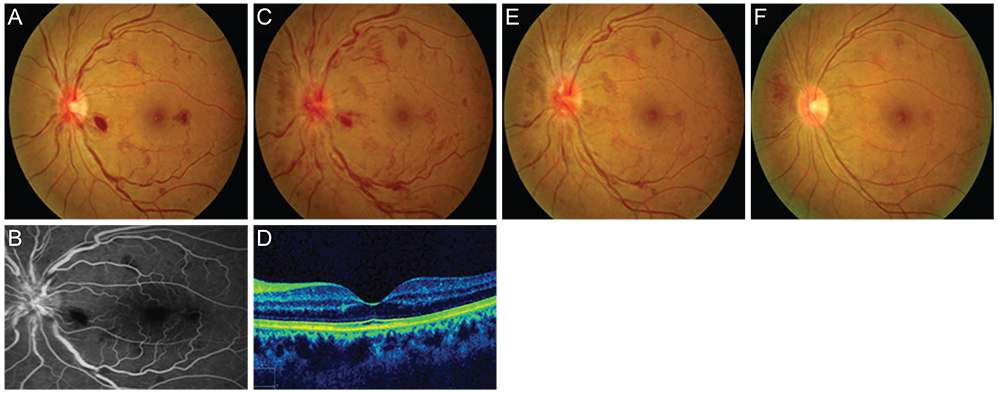Korean J Ophthalmol.
2014 Apr;28(2):192-193. 10.3341/kjo.2014.28.2.192.
Reversal of Early Central Retinal Vein Occlusion by Alleviating Optic Nerve Edema with an Intravitreal Dexamethasone Implant
- Affiliations
-
- 1Department of Ophthalmology, The Institute of Vision Research, Yonsei University College of Medicine, Seoul, Korea. hjkoh@yuhs.ac
- KMID: 1792117
- DOI: http://doi.org/10.3341/kjo.2014.28.2.192
Abstract
- This case describes the reversal of early central retinal vein occlusion (CRVO) with disc swelling after intravitreal dexamethasone implant (Ozurdex) injection. A 44-year-old female presented with sudden-onset intermittent blurred vision in her left eye. Fundus examination revealed multiple retinal hemorrhages without macular edema (ME). Two weeks later, an increased number of retinal hemorrhages with severe disc swelling were noted with still no sign of ME. An intravitreal dexamethasone implant was injected. Five days later, there were improvements in disc swelling and retinal hemorrhage. One month later, her subjective visual symptoms were completely improved, and fundus examination revealed marked improvement along with almost complete resolution of disc swelling. Intravitreal dexamethasone implant injection may potentially change the natural course of CRVO progression and its various subsequent complications.
MeSH Terms
Figure
Reference
-
1. Ip MS, Scott IU, VanVeldhuisen PC, et al. A randomized trial comparing the efficacy and safety of intravitreal triamcinolone with observation to treat vision loss associated with macular edema secondary to central retinal vein occlusion: the Standard Care vs Corticosteroid for Retinal Vein Occlusion (SCORE) study report 5. Arch Ophthalmol. 2009; 127:1101–1114.2. Brown DM, Campochiaro PA, Singh RP, et al. Ranibizumab for macular edema following central retinal vein occlusion: six-month primary end point results of a phase III study. Ophthalmology. 2010; 117:1124–1133.3. Haller JA, Bandello F, Belfort R Jr, et al. Randomized, sham-controlled trial of dexamethasone intravitreal implant in patients with macular edema due to retinal vein occlusion. Ophthalmology. 2010; 117:1134–1146.
- Full Text Links
- Actions
-
Cited
- CITED
-
- Close
- Share
- Similar articles
-
- A Case of Retinal Hemorrhage Following a Dexamethasone Intravitreal Implant
- A Case of Dexamethasone Intravitreal Implant Fragmentation During the Injection Procedure in Central Retinal Vein Occlusion
- Intraocular Pressure Changes in Patients with Retinal Vein Occlusion Treated with Intravitreal Dexamethasone Implant Insertion
- A Case of Anterior Migration of Fragmented Dexamethasone Intravitreal Implant
- Efficacy of Intravitreal Dexamethasone Implant for Macular Edema Due to Branch Retinal Vein Occlusion According to Symptom Duration


